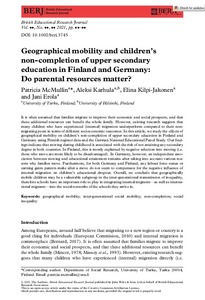Geographical mobility and children's non-completion of upper secondary education in Finland and Germany: Do parental resources matter?
McMullin Patricia; Karhula Aleksi; Kilpi-Jakonen Elina; Erola Jani
https://urn.fi/URN:NBN:fi-fe2021093047985
Tiivistelmä
It is often assumed that families migrate to improve their economic and social prospects, and that these additional resources can benefit the whole family. However, existing research suggests that many children who have experienced (internal) migration underperform compared to their non-migrating peers in terms of different socioeconomic outcomes. In this article, we study the effects of geographical mobility on children's non-completion of upper secondary education in Finland and Germany using Finnish register data and the German National Educational Panel Study. Our findings indicate that moving during childhood is associated with the risk of not attaining any secondary degree in both countries. In Finland, this is mostly explained by negative selection into moving (i.e. those who move are more likely to be disadvantaged). In Germany, however, an independent association between moving and educational attainment remains after taking into account various reasons why families move. Furthermore, for both Germany and Finland, any labour force status or earning gains parents make after a move do not seem to compensate for the negative influence of internal migration on children's educational dropout. Overall, we conclude that geographically mobile children may be a vulnerable subgroup in the inter-generational transmission of inequality, therefore schools have an important role to play in integrating internal migrants-as well as international migrants-into the social networks of the schools they arrive in.
Kokoelmat
- Rinnakkaistallenteet [29337]
